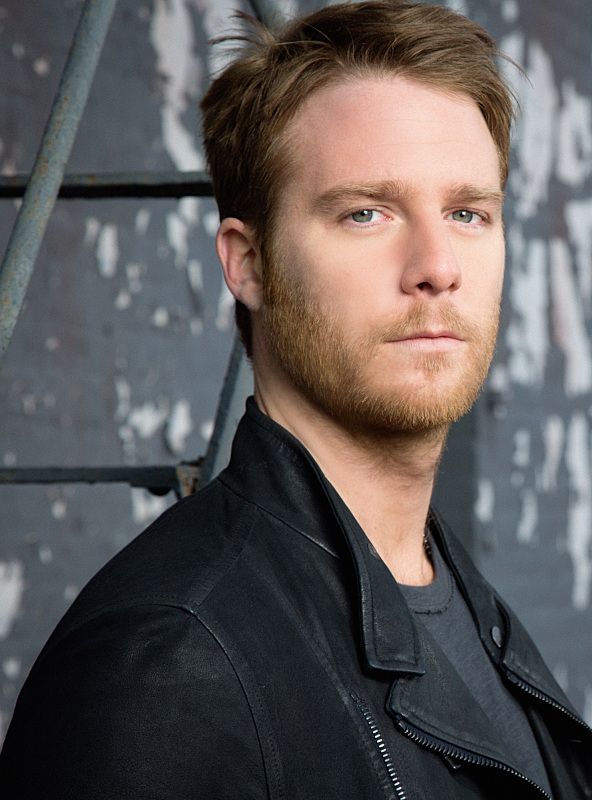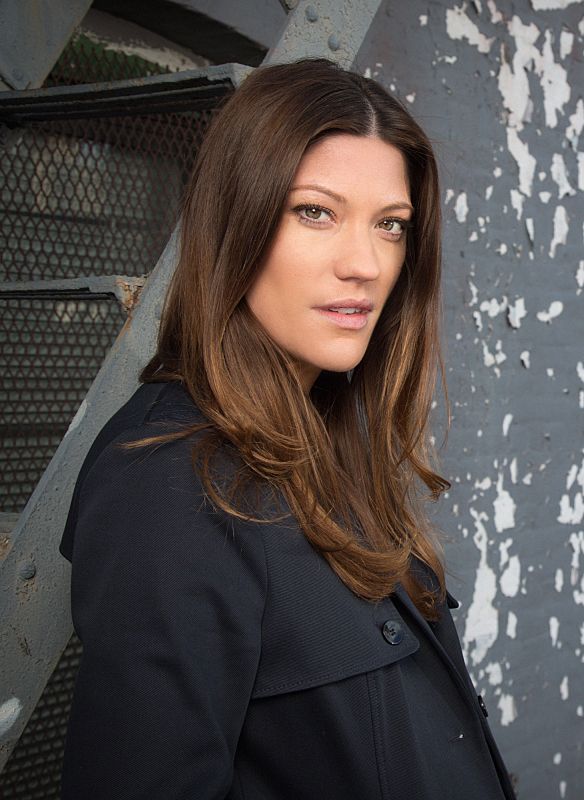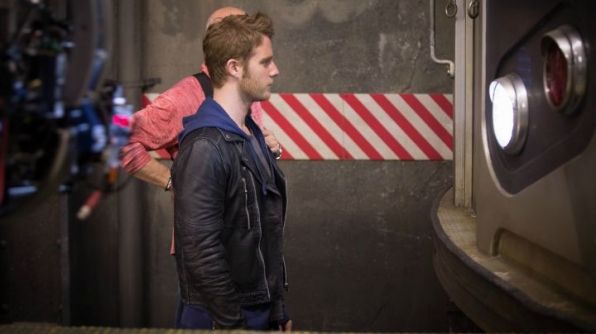Just like the people who take the intelligence-enhancing drug NZT-48, "Limitless" keeps evolving.
An adaptation of Alan Glynn’s novel “The Dark Fields,” the hit 2011 thriller starred Bradley Cooper as Eddie Morra, an author struggling with writer’s block who increases his intelligence to startling levels through the experimental “smart drug.” That, in turn, prompts him to use his heightened mental abilities to further improve his life, even as debilitating side effects threaten to derail everything he’s accomplished – and possibly end his life.
CBS continues the film’s story in the television sequel, which follows aspiring musician Brian Finch (Jake McDorman), who discovers NZT and hopes to use it for good. Recruited by the FBI, he’s teamed with a partner ("Dexter's" Jennifer Carpenter), who’ll translate his brilliance into crime-solving. He also receives frequent nudges from Cooper’s character, who has a larger, more mysterious agenda.
Ahead of tonight’s premiere of “Limitless,” McDorman and Carpenter sat down with Spinoff Online to share all the intelligence they could about the series, and reveal what they'd accomplish if given a brain boost.
Spinoff Online: Give me a sense, big picture-wise – because the pilot obviously has to set the whole thing up – of how the series is going to play out: How much of it is going to be story-done-in-one and how much is a bigger-picture serialized drama?
Jake McDorman: The picture's so large, that it's so fun to fantasize about where it could go. If you've got Eddie Morra, who has been taking this pill, presumably, every day for years, what's happened to his morality? Does he look at the human race as something beneath him now? What are his plans? That's all very up there, in the ether and sinister, maybe. And he's got tabs on [my character] Brian. I feel like there's three different fronts: There's that with Eddie Morra, then there's this relationship/partnership starting at the FBI, and then there's Brian and his dad. Because really, Rebecca's his only confidant; he can't talk to anybody else – and he can't even talk to her about everything.
So, there's definitely a procedural aspect to the show, episode to episode. But what's cool about it is it's really used to enforce this relationship, enforce trust. Brian is very delusional about how valuable and how utilized he'll be at the FBI, right when we come into the second episode, and I think he thinks after the events of the pilot he's going to get a gun and badge and go help solve crimes and shoot bad guys all over the world and they have to bring him down to Earth and be like, "No, you're a huge liability. This is probably a mistake. Stay in the basement. Don't move. Take this pill. Learn Farsi." You know, he's like, "This sucks."
So each case is an opportunity for him to prove himself to her, and also each case is a risk for her reputation, if he flies too far off the rails and gets her in trouble. But every week, there's a chime-in from Eddie Morra and what's going on there, and it's really, really exciting.
And for you, Jennifer, we see that she's got some good instincts, and she's willing to take some risks. What else do we learn about her, fairly early on, that sets her apart from other characters that you've done?
Jennifer Carpenter: I don't really ask Craig [Sweeny, the executive producer] a lot of questions about what's in the pipeline, because I don't know that it would work to my advantage to know that. Because I don't think Rebecca is a psychic, so I don't want to know too much.
McDorman: Yet.
Carpenter: True. But I honestly feel like Rebecca and I, Jennifer, have a lot in common right now, because I'm trying to focus this character like I'm trying to focus my job, really, because I don't know what Brian's function is, in the day to day of working with the FBI – I don't quite know how to play it. And that's fun, because I do feel like she's someone who is kind of settled and kind of has a pattern for navigating her work and her life and her friendships and relationships. So, in a weird way, it's exciting and he's her connection to humanity. Because I don't think she hangs out with people that act like him and move like him and think like him.
McDorman: Yeah. As underqualified as he is, most of the time.
Carpenter: Yeah, I spend a lot of time staring at Jake playing Brian like, "What kind of animal are you?" [Laughs] You know what I mean?
Jake, because he's now operating in an unusual world and he's a different kind of human being, essentially, figuring out your physical language for how you want to play that -- how much of that did you look at what Bradley did in the movie? How much did you figure out was specific to him, and then different for your character? Give me a sense of how that came together for you.
McDorman: There's some rules that we wanted to establish for being on NZT and where you really just play jazz and so your own thing is when you're off NZT. That establishes a good congruency between the movie and the show – and also, just realistically, seeing different ways this drug affects your posture and affects you technically, it's just good visual cues for when you're on and when you're off.
And Bradley was just an amazing resource. He was in New York when we were shooting the pilot. He was doing "The Elephant Man," so he was just a phone call away about, "OK, do you stand up straight?" "Oh, yes. You make eye contact. Every gesture's very deliberate." So once we locked a few of those down, then you could really play with who he is when he's off the drug.
But you're right, there has to be a tether. You don't want the switch to be so severe that it's like a Dr. Jekyll, Mr. Hyde. It's not like you forget everything that happened when you're on NZT. It's the opposite. It's just not readily available once when you're on the drug. So the experiences you have on the drug, in this enlightened state, and the interactions you have with people when you're like that, do influence your personality when you're off of it. So it's just really a balance, episode to episode.
There's also some great visual cues that [director] Marc Webb established. The way he shoots when you're on the drugs, it's a bunch of still and stationary camera shots, with warmer colorization than when you're off. It's more handheld and bluer. There's a lot to do that, but that was one of the biggest challenges and exciting parts of playing Brian is you essentially have two characters in one.
Unlike on "Dexter," Jennifer, you have no curse words on a network show.
Carpenter: Yay! (Laughs)
Was that sort of like, an interesting challenge: "OK, I can do this, I can do dialogue without cuss words"?
Carpenter: Yeah, I'm oddly OK with it. Yeah.
McDorman: There's that one scene where Rebecca just loses it with me.
Carpenter: Yeah, yeah, yeah. (Laughs) I don't need them. I don't need them.
McDorman: You're a mom now. You can't use those words.
Carpenter: Yeah, right.
You've played somebody in law enforcement before, so what do you want to do to, physically, looks-wise, etc., to distinguish her from Debra Morgan?
Carpenter: Right. Well, I did just have a baby, so this kind of felt like the right move in that I've already done a ton of research on it. I already know what that world is, and now it's just about "Who is this person? How does she walk and talk and move and think?" and all of those good things. I always thought that I would do comedy. That's where I felt most comfortable when I was training and all of that good stuff.
Even on "Dexter," you had so much funny stuff to play.
Carpenter: That's nice of you to say. I never really felt like that. That's been the breath of fresh air about this is that Jake did something the other day, when we were filming the second episode, and I almost laughed and I thought, "What is this? You can laugh at work?" I mean, I don't know. I think playing Rebecca is actually somehow – There are more parallels between her and I than there ever were between me and Deb. Until of course much later, when the writers started writing me what they know to be true about your life. I don't know. It's just more buoyant. It's just more fun.
McDorman: It's a classic kind of partnership of one trying to keep him in line, keep his hands in his pockets, like you say. "No, but I want to – Put me in, put me in, put me in, coach!" That kind of enthusiasm, which is fun to play with. I think Brian, I mean he was the lead singer of a failed band, so he does have the air of he likes to be the center of attention.
There's some showmanship in him.
McDorman: And this is a better way. He can do it so efficiently and he has the confidence/calmness of knowing he's right, temporarily. So I think he likes to test the boundaries. I think he likes being the black sheep, a little bit – and revels in that.
Carpenter: One conversation I had with Craig earlier on is I feel like a lot of times in television, people, cops and law enforcement agents, are written like their life depends on whether this case is solved or not; and it just doesn't. I would imagine there are small victories and sometimes you just live with those. The case goes unsolved or the guy gets away, but you did your job and you did it well and "a" led to "b" and so on, and you go as far as you can. And he's going to help me get these small victories, and that's my drug.
McDorman: I think the larger conspiracy will be playing out all across those fronts. Eddie Morra will play into the FBI, will play into that's going to be the living big picture.
The minute this show airs, there will be an instant contingent of the viewership that's going to want to see you guys become a couple on the show.
McDorman: Really?
That's become inevitable on every show.
Carpenter: That's the second time someone's said that.
McDorman: Do you really think so?
I don't see that the show's designed for that.
Carpenter: But that's what shows do.
Some viewers are going to start asking for it.
McDorman: It seems like an archetypal misfire.
You guys don't see it that way.
McDorman: No.
Carpenter: No. I feel like it's more brother-sister.
McDorman: It seems like a sibling. Yeah. It's never once entered my –
Carpenter: Me neither.
McDorman: I mean, even before I knew who was playing whatever, in the script, I was like that's not the way. It's too smart. It's too smart.
Carpenter: They're not suited for one another at all.
McDorman: I don't see that happening.
Carpenter: What would they talk about? No, I'm kidding. (Laughs)
So you want to nip the shipper talk in the bud right now.
Carpenter: Can you imagine if they tried to go see a movie? She'd want to see some French film and he's like –
McDorman: Let's go see "Bad Boys!"
Carpenter: Yeah, "Fast and Furious." I would actually go see that.
What intrigues you about just the very premise of a drug like this and what it could do?
McDorman: You can get so meta talking about NZT. I've skipped to Season 10 with Craig and he's like, "Calm down, we're on Episode 2."
"What happens if everybody was on it? Do we evolve as people? Is it that crazy?" So that stuff excites me. I mean, there's a science fiction element to it, too, that makes it really, really fun. I'm so curious as to how, if you're taking this pill every single day of your life, and that's become your norm, your morality's got to morph or mutate.
You've got to look at the people that aren't on it as like the mouth-breathing masses or something. Especially, that's the fear of Eddie Morra, does he really have a good idea of where the future's going to go? Would everybody be better off if we all just somehow genetically hardwired this supply of this drug in our system? Is that better or is that playing God? I don't know.
Carpenter: I think the flaw in that is like if you were taking this every day of your life, that's where it falls apart. It's not your life. It's not your life.
McDorman: But is it, though?
Carpenter: It's not.
McDorman: But here's the thing: Like, Brian takes it and has a much different effect --
Carpenter: You need water and you need food.
McDorman: His character hasn't been compromised. Maybe it, like Eddie Morra is just a different animal than Brian. And I have no idea where that's going, but I wonder if they're going to become each other's greatest adversaries. Who knows?
One thing you would insta-learn, if you had the capability? Is there something you would say, like, "Yes, that would be worth it"?
McDorman: French.
Carpenter: Really?
McDorman: Yeah. A language, for sure. I just feel so hopelessly American only knowing English.
Carpenter: Well, I wouldn't take it. For the sake of the question though, I mean, I'm kind of furious with how our government operates. Congress. I think there should be a limit on how long you can live in Congress and be a representative, so I would get in there and change government. I would run for something. I would probably do what Eddie Morra's doing.
McDorman: God, how could you?
Carpenter: But maybe with a better or a more focused moral center.
McDorman: You don't know. How do you know, until you take it?
Carpenter: (Laughs) I love it!
“Limitless” airs tonight at 10 ET/PT on CBS.






